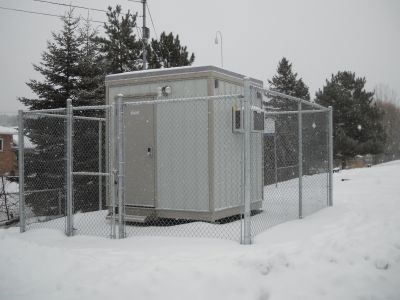BESTECH has renewed its contract to operate Sudbury’s sulphur dioxide monitoring network for another five years, the second such renewal since the company took over operation of the network in 2003.
The company is responsible for monitoring the SO2 emissions from Sudbury’s two biggest emitters, Vale and Xstrata Nickel, and reporting to the province to ensure they don’t go over their emissions limits.
Data is provided in real time, and is made public, according to ministry stipulations.
Pat Dubreuil, BESTECH’s vice-president of operations for sales and marketing, said the company’s role is to ensure the companies are following regulations.
“Vale and Xstrata had a control order, which gives special permission to emit, because the technology that they were using didn’t enable them to meet the provincial standards,” he explained. “So they had these limits, and they’re fined if they exceed these limits. Our role is to create a transparent, third-party bridge to provide that data back to them and help them control their emissions.”
Previous to 2003, when the province was running the network, companies were posting their emissions numbers on their own websites. BESTECH has implemented a number of innovations since taking over the network, including setting up a monitoring station at Science North that collects air samples and feeds the data back to the companies. An interactive display illustrates where the 17 stations are in Sudbury and gives readings from those stations.

BESTECH’s SO2 mobile unit is capable of providing real-time readings to operators and the public website. The system is used to confirm public air quality complaints.
In 2007, the company retrofitted a Toyota RAV4 into a mobile monitoring station for Vale that is dispatched to monitor strategic areas throughout the area.
“It’s pretty cutting edge,” Dubreuil said. “There aren’t any other networks out there that do that, and BESTECH basically put that together for them.”
Frank Javor, Vale’s manager for environment, air, for Ontario operations, said the monitoring is an essential tool to the company’s emissions reduction program.
“For us, the data is very important, not just from the legal perspective, but we use the information, as does Xstrata, in real time to control the operations of our smelter,” he said. “So to make sure that we don’t have an elevated concentrated level of sulphur dioxide in the community.”
Vale has been pleased with BESTECH’s performance, and even with the Clean AER project, a $2-billion project that is aiming to reduce Vale’s emissions by 70 per cent of current levels, the company will still rely on the SO2 monitoring network, Javor said.
“Our emissions will go down very substantially, but we will still want to control and make sure we have good air quality in Sudbury, and the same with Xstrata,” Javor said.
In addition to Vale and Xstrata Nickel, Iron Ore Canada in Newfoundland also uses BESTECH’s network. The company is now marketing the system in Latin America, in places like Chile where rock formations present ideal places for pollution to congregate and a nightmare for companies to regulate. By gathering weather data, the system is able to predict when an excess of pollution may occur, signalling a need for an emitter to curb its emissions.
BESTECH is also looking ahead to future regulations. Legislation is changing to require emitters to provide ventilation based on air quality rather than the amount of horsepower generated by underground vehicles, Dubreuil said. But the change will actually be a good thing, since companies can ventilate on demand, saving on energy consumption and, ultimately, cost.
Dubreuil said it’s an exciting time for BESTECH, as it’s able to evolve its technology to simultaneously bring it in line with the client’s needs and the legislative requirements.
“Having these emitters put in technology that is continually reducing the emissions and going and changing the landscape is fantastic,” he said. “I think we’re quite lucky in Sudbury to have such responsible companies.”




